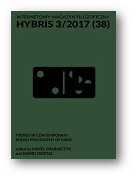Semantic internalism is a mistake
Semantic internalism is a mistake
Author(s): Krystyna BieleckaSubject(s): Psychology, Cognitive Psychology
Published by: Wydawnictwo Uniwersytetu Łódzkiego
Keywords: internalism; externalism; one-factor dimensional account of representation; mental representation; Fodor; methodological solipsism;
Summary/Abstract: The concept of narrow content is still under discussion in the debate over mental representation. In the paper, one-factor dimensional accounts of representation are analyzed, particularly the case of Fodor's methodological solipsism. In methodological solipsism, semantic properties of content are arguably eliminated in favor of syntactic ones.If “narrow content” means content properties independent of external factors to a system (as in Segal's view), the concept of content becomes elusive. Moreover, important conceptual problems with one-factor dimensional account are pointed out as a result of analysis arguments presented by J. Searle, S. Harnad and T. Burge. Furthermore, these problems are illustrated with psychological and ethological examples.Although understanding content as partially independent from contextual factors allows theorists to preserve content properties, it seems that understanding content in total abstraction from external factors of these properties is implausible. As a result, internalism is rejected in favor of externalism.
Journal: Internetowy Magazyn Filozoficzny HYBRIS
- Issue Year: 2017
- Issue No: 38
- Page Range: 123-146
- Page Count: 24
- Language: English

